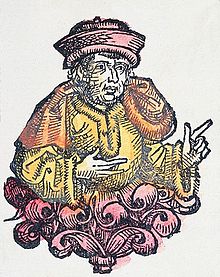Arnobius of Sicca
| Arnobius the Elder | |
|---|---|
 |
|
| Died | c. 330 |
| Other names | Arnobius Afer |
Arnobius of Sicca (died c. 330) was an Early Christian apologist of berber origin, during the reign of Diocletian (284–305). According to Jerome's Chronicle, Arnobius, before his conversion, was a distinguished Numidian rhetorician at Sicca Veneria (El Kef, Tunisia), a major Christian center in Proconsular Africa, and owed his conversion to a premonitory dream. Arnobius writes dismissively of dreams in his surviving book, so perhaps Jerome was projecting his own respect for the content of dreams. According to Jerome, to overcome the doubts of the local bishop as to the earnestness of his Christian belief he wrote (c. 303, from evidence in IV:36) an apologetic work in seven books that St. Jerome callsAdversus Gentes but which is entitled Adversus Nationes in the only (9th-century) manuscript that has survived. Jerome's reference, his remark that Lactantius was a pupil of Arnobius and the surviving treatise are all that we know about Arnobius.
Against the Pagans was composed in response to Diocletian's persecution of Christians, and was a rebuttal to Pagan arguments as to why the persecution was justifiable. Arnobius, "a practitioner of the coarse and turgid style that is called African", is a vigorous apologist for the Christian faith, more earnest in his defence of Christianity than perfectly orthodox in his tenets. His book has been occasioned by complaints that the Christians had brought the wrath of the gods on Ancient Rome. Thus, he holds the heathen gods to be real beings, but subordinate to the supreme Christian God; in a streak of gnosticism, he affirms that the human soul (Book II, 14 - 62) is not the work of God, but of an intermediate being, and is not immortal by nature, but capable of putting on immortality as a grace. Never specifically identifying his pagan adversaries, some of whom may be straw men, set up to be demolished, Arnobius defends and expounds the rightness of monotheism and Christianity (deus princeps, deus summus) and the divinity of Christ, by adducing its rapid diffusion, its influence in civilizing barbarians and its consonance with the best philosophy. Christianizing Plato, he refutes pagan idolatry as filled with contradictions and openly immoral, and to demonstrate this point, his Books III through V abound with curious information gathered from reliable sources (e.g. Cornelius Labeo) concerning the forms of idolatrous worship, temples, idols, and the Graeco-Roman cult practice of his time, to the historian and mythographer's cautious delight, but all held up by Arnobius for Christian ridicule.
...
Wikipedia
